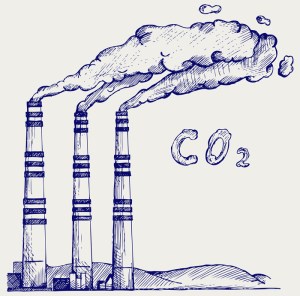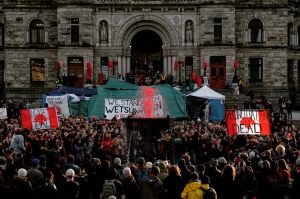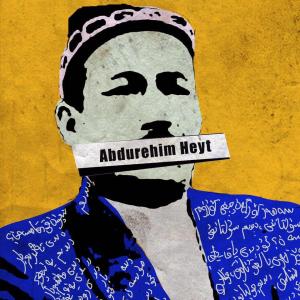In recent years Mexico has been doggedly stuck in the ‘Gray Zone of Democratization’ caught somewhere between authoritarianism and democracy. Its place on the spectrum is hard to mark. Avoiding classifications as being neither authoritarian nor fully democratic, a wide range of adjectives have been applied to Mexico, from minimalist or electoral democracy to a hybrid or semi-democracy. As discussed by Schmitter and Karl, there has been an abandonment of such qualifying adjectives, “towards a common definition of democracy.” This new definition focuses on the minimal conditions that states must meet, “in order to merit the prestigious appellation of ‘democratic.’” Schmitter and Karl define modern political democracy as: “A system of governance in which rulers are held accountable for their actions in the public realm by citizens, acting indirectly through the competition and cooperation of their elected representatives.” Daniel Levy and Kathleen Bruhn add respect for the rule of law to this definition. Although it may be ambiguous exactly where Mexico lays in the ‘Gray Zone,’ consensus from academia makes one thing clear:
Mexico has not yet achieved the minimal conditions to be categorized as democratic. The Mexican drug cartels are key to understanding why the government has not yet met these conditions. First, cartel violence eliminates political competition in general and, importantly, during elections. Second, campaigns are often funded by the cartels, especially at the municipal level, which further disrupts free and fair elections. Funding and bribery allow cartels to gain power by infiltrating the government, thus contributing to broader government corruption. Next, this corruption and a lack of state power allow the cartels to legitimately challenge the Mexican government. The cartels’ possession of territory throughout Mexico best exemplifies the state’s lack of capacity and eradicates the rule of law. Finally, cartel-related government corruption results in violence and human rights abuses that violate citizens’ rights. Perpetrators’ crimes face no justice as corrupt officials grant impunity, demonstrating a lack of governmental accountability. The drug cartels in Mexico ultimately prohibit the government from achieving democracy.
Cartels and Elections
Mexican cartel violence continuously diminishes opposition in general and, specifically, eliminates political competition and reduces voter participation during elections. Kidnappings, disappearances, and assassinations by cartels of government personnel are common and happen regularly. These, ‘high-visibility crimes’ include, “abductions of businessmen or their family members and assassinations of political and media personalities.” ‘Narcotraffickers’ are known to execute rival drug groups or political enemies, “mercilessly and publicly.” Violence against these politicians and former government officials is carried out, “presumably either for refusing to be bribed or because they have offered protection to rival cartels.” The wave of political assassinations in the early 1990s, including of the Cardinal of Guadalajara in 1993 and the ruling party’s number two official in 1944, exemplifies this unfortunate reality over the last several decades. More recent empirical data reveals that from late 2006 to fall 2011, “174 police, officials and politicians were murdered…all apparently killed by organized crime.”
When violence against government or candidates occurs during elections, the opposition is eliminated in favour of the cartels. The precedent for electoral murder was set in the 1944 presidential elections when the ruling party’s presidential nominee, Luis Donaldo Colosio, “almost surely the next president,” was assassinated at a campaign rally in Tijuana. President at the time, Carlos Salinas, guilty of organized crime and political corruption, ordered Colosio’s murder. Colosio was presumably killed for his campaign to end ties with the cartels and for his fight against the corruption of which Salinas was involved. The trend continued in recent years. On June 28, 2010, Rodolfo Torre, “The PRI candidate for the governor of Tamaulipas, was executed by organized crime elements while campaigning in the midst of his delegation.” Just last year, in 2016, as elections for governors took place in 12 states, political leaders reported, “scattered incidents of election-related violence.” Such violence included attacks on party members, arson of property and vehicles, the kidnapping of an opposition campaign member, and gasoline bombs thrown at both a political party office in Xalapa and the state congress building in Zacatecas. Other incidents included attackers breaking into a mayor’s home and setting it on fire in Acejete, and attackers damaging buses carrying campaign material in Sinaloa. These incidents all demonstrate an intentional attempt by various cartel members to sabotage opposition candidates or political parties. The cartels’ strategy to diminish opposition directly violates Schmitter and Karl’s definition of democracy as rulers cannot act, “through the competition…of their elected officials.”
In addition to the physical elimination of candidates and the destruction of campaign assets, organized crime in Mexico has worked to diminish voter participation in elections by creating an environment of fear in society through violence. Election-related violence by the drug cartels sends a chilling message to political figures and society as a whole to not oppose the cartels. According to one source, violence has been on the rise since 2000: “Narco-cartels have prospered in Mexico,” and, “their violent tactics have generated a climate of terror among the population.” A series of election-related violent incidents were reported by The Guardian in 2016. Many of these incidents were aimed at dissuading voters from casting their ballot. In Oaxaca, a mob burned ballots and threatened to prevent the opening of polling stations. A decapitated head was strategically placed in front of a polling station near Xalapa. Further, residents of Veracruz received threatening text messages advising them not to vote. The astonishing threat of violence to political candidates and to those who demonstrate their support for an opposition candidate undermine free and fair elections in numerous ways. Specifically, this violence ensures a lack of representation, freedom of speech and association, and legitimate political opposition or competition required in a democracy.
State Corruption
In addition to the Mexican drug cartels’ history of regular violence and crime during elections, they are repeatedly linked to corruption of election candidates and government leaders in general. Cartel funding and bribery of candidates and political parties have reached all Mexican states and all levels of governmental authority. During elections, drug cartels, “[promote] and [fund] candidates and deputies and mayors.” Political parties have become dependent on powerful local leaders who are often connected to drug gangs, known as caciques, to gain election votes. In turn, candidates lend their support and do favours for cartels who hope to seek power by infiltrating the government. Fidel Herrera’s campaign in the 2013 Veracruz municipal elections exemplifies these cartel-candidate relations. A United States federal court following the elections, “heard testimony that Herrera’s election campaign received millions of dollars from the Zetas cartel.” The state’s link to organized crime during elections further diminishes political competition and therefore democracy.
Drug cartels are not just linked to political leaders during election times. According to Peter Watt and Roberto Zepeda, the narcotraffickers in Mexico have, “kidnapped the municipal structure of the country.” State institutions are said to be, “as inextricably involved in organized crime as the cartels themselves.” A United Nations report published in 2010 reveals that “around 60 percent of all the municipalities in Mexico have either been infiltrated or are controlled by narcotrafficking cartels,” and, “the problem appears to be endemic in all states in the country.”
This widespread infiltration has blurred the lines between cartel and government, resulting in vast corruption. Recent evidence confirms criminal organizations’ co-optation of local government institutions. As the authors of, “Mexico: The Struggle for Democratic Development,” note, “It is not then drugs versus government as much as drugs infiltrating government.” Infiltration has turned government policy from a war on drugs to a war, “for drugs,” in the words of Peter Watt and Roberto Zepeda. It seems, then, that there is a general consensus today among scholars that the Mexican state, “rife with corruption,” is, “part of the problem rather than the solution.” In a co-opted or corrupt state, government rulers and criminals are not necessarily distinct from each other. State officials, therefore, do not follow the rule of law or hold themselves accountable for their actions. Since their interests are for their organized crime groups, they do not accurately represent the people. They threaten and eliminate any competition, and cooperate with other corrupt officials. Cartel infiltration and government corruption, therefore, explain Mexico’s failure to meet the minimum conditions required for a democracy.
The State’s Struggle for Control
Cartel infiltration and corruption weaken the government, creating a lack of state capacity and will to suppress the cartels. Cartels are able to gain power and challenge uncorrupt state officials and other opposition forces. Particularly since President Felipe Calderón came to office in 2006, “the state has lost much of its political authority and control.” If the state is weakened or lacks capacity, “it lacks a monopoly on force…in its territory.” When the government loses political authority and control through a monopoly of the legitimate use of physical force, the cartels fill in. Drug cartels, “capitalize on anti-government sentiments and have operational control of certain geography.” Cartel control over territory best exemplifies the serious challenge they pose to the state and therefore to the rule of law. Controlling territory allows cartels to move drugs freely and replace the state by taxing people who pass through. Cartels also capture land for the purpose of demonstrating that, “the state and or rival drug networks lack control over territory and are incapable of governing.” The battle for territory between rival cartels also undermines the state’s authority by upsetting “power balances.” The cartels’ control of territory due to a weakened or non-existent government poses a legitimate threat to the state’s power and legitimacy by eliminating any state presence, including credible protection and rule of law. As the definition of democracy provided by “Mexico: The Struggle for Democratic Development” states, democracy, “relies largely on the rule of law.” The Mexican government’s weakness or absence in regions throughout the country causes an inability to implement or enforce the rule of law, which prevents them from attaining the minimum conditions needed in a democracy.
State Crime and Impunity
Cartel-related government corruption in Mexico causes the state to engage in human rights violations itself, and turn a blind eye to others doing it. These crimes face no consequence or punishment, as corrupt officials grant impunity, demonstrating a lack of governmental accountability. Though the line between cartel and state is blurred, it is clear that both actors engage in crime. In addition to the drug cartels, the Mexican government regularly and illegally represses citizens. The state has been caught in, “kidnappings, extortion, disappearances, bullets and death” where criminals face no charges. Police, “not only fails to provide adequate protection… but they are often the active organizers of ‘professional crime,’ taking advantage of their special information, contacts, and skills.” Survey research indicates that about, “70 percent of Mexicans view the police as corrupt and feel unprotected.” Law enforcement officials acknowledge the Mexican government’s, “inadequate internal investigations,” and, “high-level infiltration by organized crime,” which they believe underlie Mexico’s unrestrained corruption. Because the drug cartels have infiltrated the government, state officials often do not hold other officials accountable for crimes committed, and they also grant impunity to cartel criminals. In cases where the government is not corrupt and does, in fact, try to convict criminals, it is not strong enough to succeed. When state authorities arrest criminals or corrupt officials, they are often unable to provide satisfactory evidence, and “many [are] subsequently released.” Criminals are often, “exonerated of all charges.” Some do not receive adequate punishment or are able to be released on bail and never reappear. Other criminals flee during investigations or escape from prison and are never pursued again. The government’s law enforcement agencies lack professionalism and also checks and balances since other government sectors or levels of authority do not keep tabs on them. Additionally, the Mexican judicial sectors lack transparency and administrative capacity. The government as a whole, then, lacks accountability, a crucial condition necessary for achieving democracy.
Impunity, with corruption, has spread to all levels of the government and all regions of the country. In 1998, the national government disclosed that “94 percent of all violent crime in Mexico City was not prosecuted or resolved.” Around 2010, an estimated 98 to 99 percent of all crimes did not result in a sentence. The same source revealed that “an [estimated] three-quarters of crimes [went] unreported” due to the citizens’ lack of trust in the Mexican legal system. Impunity is again seen following Fidel Herrera’s 2013 election campaign. As previously mentioned, a U.S. federal court heard testimony that Hererra received millions of dollars in funding from the Los Zetas cartel for his campaign. He has denied allegations and is not under investigation. He has even been granted amnesty of sorts, as he, “is currently at Mexico’s consul in Barcelona.” Herrera’s case is a clear example of how cartels contribute to the Mexican government’s immunity from the rule of law and institutional abjection.
The mass kidnapping in Iguala in 2014 may provide the best example of Mexico’s state repression and the subsequent problem of granting impunity. In what has been called “Mexico’s highest-profile human rights scandal of recent years,” 43 male students on their way to a protest commemorating the anniversary of the 1968 Tlatelolco Massacre were met with gunfire from police in the town Guerrero. Testimonies from survivors reveal that the students were then forced off the bus and taken away in patrol cars, where they were presumably killed soon thereafter. Of the 123 people detained for organized-crime charges in relation to the kidnappings and homicides, 73 were Iguala police officers whom the Mexican authorities have linked to a powerful drug cartel called the Guerreros Unidos. Others detained include the Mayor of Iguala and his wife. More recent evidence suggests that even federal police forces or military personnel were involved in the cartel-invoked atrocities. In addition to further exemplifying government corruption and violence, the incident touches on the restrictions of the freedom of organization and speech, as the students were on their way to a protest. Perhaps the most disappointing aspect of the situation, however, is that the investigation is still ongoing, leaving families without answers and criminals free from consequence. Protestors of the state’s ongoing and inconclusive investigation, “demand that government doesn’t just wash its hands.” As the LA Times perfectly sums up; “The case has also become a rallying cry for those who see it as emblematic of the official culture of impunity and corruption that continue to undercut justice and accountability.” The crime in Mexico, in general, is, “horribly out of control,” and, “a salient issue for an aroused citizenry that demands accountability from its government.” The incident highlights state corruption and human rights abuses and a restriction on the freedom of organization and speech, all of which violate the rights of a citizen, a concept crucial to Schmitter and Karl’s definition of democracy. Violations of citizens’ rights, coupled with a strong lack of accountability, indicate that Mexico does not have the minimal conditions required for a democracy.
In an attempt to cover government and cartel atrocities and human rights abuses, both actors have also been known to suppress the freedom of speech and of the press. Through “threats and bribery,” cartels are able to control and minimize press coverage of the violence. Corrupt government officials similarly utilize a form of media censorship by keeping tabs on journalists, threatening them, and confiscating journalistic materials. For example, at a celebration of freedom of speech event, ironically enough, the Governor of Veracruz, Javier Duarte de Ochoa’s private security forces, “manhandled a photographer.” Reporters in Veracruz say it is common for, “local journalists [to be] filmed and photographed by informants.” Suppression of basic freedoms and surveillance of the media and other forms of censorship further hinder prospects for achieving democracy.
Democracy or Narcocracy?
In 1986, there was a call by scholar Enrique Krauze, “for a Mexican, ‘democracy without adjectives.’” Three decades later, his call still remains relevant. Mexico lacks the minimal conditions necessary to be categorized as purely democratic without modifying adjectives. The drug cartels are central to understanding this lack of democracy. Cartel violence and funding of political campaigns disrupt free and fair elections. This violence eliminates political competition in general, and bribery with state officials allow cartels to infiltrate the government and gain power, thus contributing to broader corruption. Furthermore, the Mexican government faces a legitimate threat by the cartels as a result of the state’s corruption and a lack of power. The cartels’ possession of territory throughout Mexico best exemplifies the state’s lack of capacity and of following the rule of law. Cartel-related government corruption also results in violence and human rights abuses that disrupt citizens’ rights. State crimes and subsequent impunity granted by corrupt officials demonstrate a clear lack of government accountability. The absence of accountability, political competition, citizens’ basic rights and the rule of law, in particular, are clear violations of the definition of democracy as set forth by Schmitter and Karl, and Levy and Bruhn. Having not yet achieved democracy, Mexico has remained in the ‘Gray Zone’ for decades. Mexico, then, acts as evidence that countries in this zone may not be on a linear path to democracy, as the ‘transition paradigm’ suggests, but are rather perpetually stuck in their own category of regime type. This analysis of Mexico indicates that academia should rethink the ‘transition paradigm,’ as Mexico, though not authoritarian, may never reach democracy.
Sources
Agren, David. “‘There Are Two Governments’: Mexican Elections Held in Shadow of the Cartels.” The Guardian. Guardian News and Media, 26 May 2016. Web. 31 Mar. 2017.
History.com Staff. “Leading Mexican Presidential Candidate Assassinated.” History.com. A&E Television Networks, 2010. Web. 31 Mar. 2017.
Jones, Nathan P. “Mexico’s Illicit Drug Networks and the State Reaction.” McGill University, Humanities and Social Sciences Library (2016): 19-45. Georgetown University Press. Web. 31 Mar. 2017.
Lakhani, Nina. “Mexico Elections Cast Light on Governors – and State Systems Built on Corruption.” The Guardian. Guardian News and Media, 02 June 2016. Web. 31 Mar. 2017.
Levy, Daniel C., and Bruhn, Kathleen. Mexico: The Struggle for Democratic Development.
Berkeley, US: University of California Press, 2006. ProQuest ebrary. Web. 31 March 2017.
McDonnell, Patrick J., and Cecilia Sanchez. “It’s Been Two Years since 43 Mexican Students Disappeared, and We Still Don’t Know Exactly What Happened to Them.” Los Angeles Times. Los Angeles Times, 26 Sept. 2016. Web. 31 Mar. 2017.
Schmitter, Philippe C., and Terry Lynn Karl. “What Democracy Is… and Is Not.” Journal of
Democracy (1991): n. pag. Ned.org. National Endowment for Democracy. Web. 30 Mar. 2017.
Semple, Kirk. “Missing Mexican Students Suffered a Night of ‘Terror,’ Investigators Say.” The New York Times. The New York Times, 24 Apr. 2016. Web. 03 Apr. 2017.
Shirk, David A.. Drug War in Mexico : Confronting a Shared Threat. New York, US: Council on
Foreign Relations Press, 2011. ProQuest ebrary. Web. 31 March 2017.
Staff and Agencies in Mexico City. “Federal Police Witnessed Abduction of 43 Missing Mexican Students – Witness.” The Guardian. Guardian News and Media, 15 Apr. 2016. Web. 31 Mar. 2017.
Tuckman, Jo. Mexico : Democracy Interrupted. London, US: Yale University Press, 2012.
ProQuest ebrary. Web. 31 March 2017.
Associated Press in Veracruz. “Mexico Elections: Violence Reported as States Vote for New
Governors.” The Guardian. Guardian News and Media, 05 June 2016. Web. 31 Mar. 2017.
Watt, Peter, and Zepeda, Roberto. Drug War Mexico: Politics, Neoliberalism and Violence in
the New Narcoeconomy. London, GB: Zed Books, 2012. ProQuest ebrary. Web. 31 March 2017.





